Ghana 
Beyond modified histories written by mainly non-Africans, only little is known about Ghana, its vast and diverse rich cultures, its role in decolonization and African unity, and how it maintains its pivotal role as a leader in continental renaissance and sociocultural reintegration of the African diaspora, from experiences and oral sources of Ghanaians themselves. Ghana is a country in Western Africa situated on the coast of the Gulf of Guinea. With a human population of about 30 million (2021 Population and Housing Census) spanning several different ethnic groups. It is rich in a diversity of people and ethnic cultures, minerals, forests and diverse animal life. The country is the first African country south of the so-called Sahara that gained independence, after Liberia, Sudan, and Egypt. Widely known as one of the most peaceful countries in the world, Ghana boasts of a warm and vibrant social life, unique hospitality, and respect for visitors.
Socially, Ghana counts among the most peaceful countries in Africa (Institute for Economics & Peace, 2021). Drawing on quite a high sense of collectiveness, the people of Ghana maintain a communal social functioning that encourages tolerance, peace, and cohesion between people. Though ethnically very diverse, social bonding between people transcends to non-Ghanaians and visitors to the country. Whether Ghanaian or foreigner, everyone in Ghana finds incentives to live freely and peacefully with each other. While allegiance to ethnic and religious grouping is very high among the majority of people, Ghanaians have rather cultivated ethnic and religious differences as valuable resources for peaceful co-existence in rich diversity (Anquandah, 2013). Over the centuries, religion, social and cultural relations, and traditional leadership (chieftaincy), to mention a few, have been major unifying factors of people of different ethnicities in Ghana. This places Ghana apart and unique across Africa, a continent where religious, political, social, cultural, civil, and environmental differences maintain tensions and conflicts that obliterate lives, hope, and entire societies daily. The wealth of traditional history of different ethnic societies in Ghana offers new insights into cultures in Ghana and Africa.
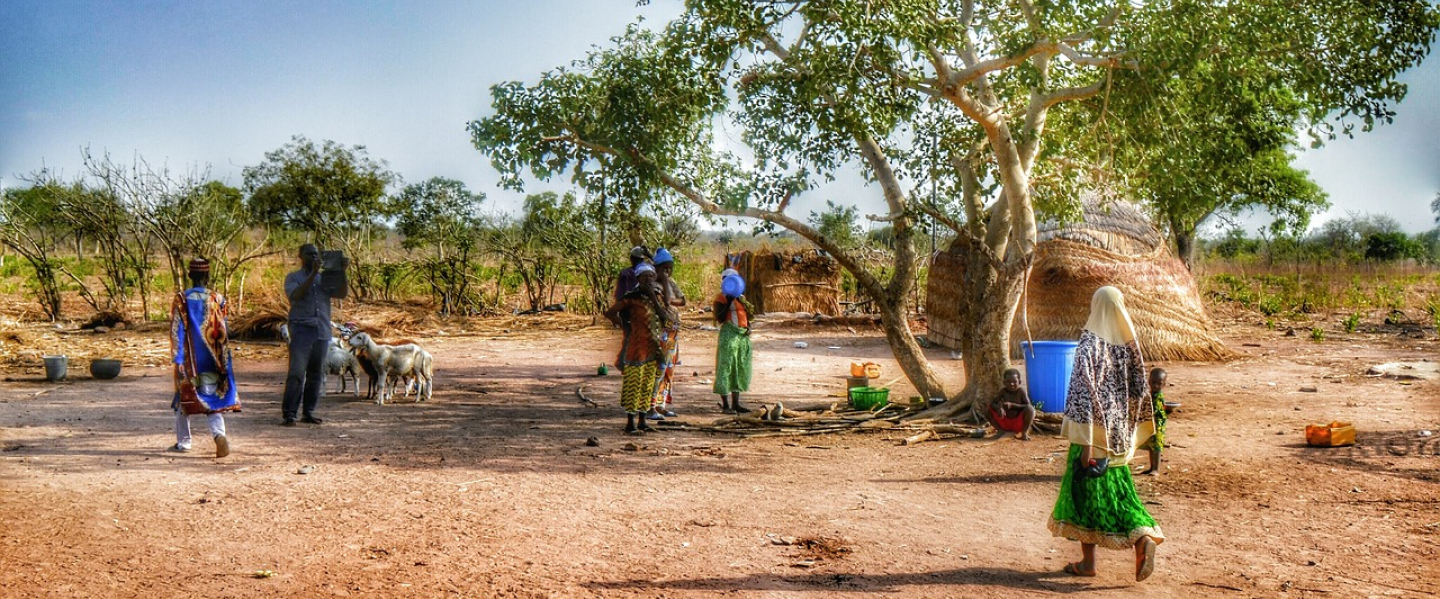
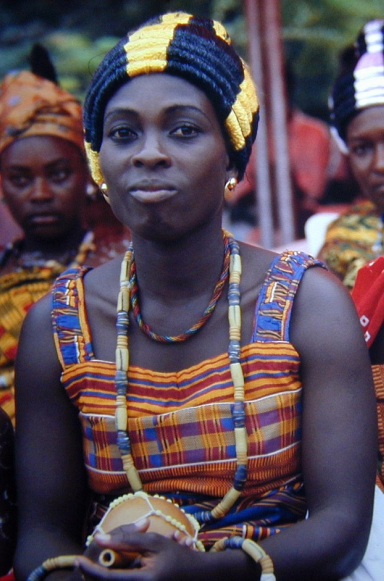
One of the many features of Ghana is its diverse sociocultural events called Festivals. They are meant for cleansing rituals, celebration of past victories, signification of planting and conservation, affirmation of the bond between the living and the departed, among other goals. Every region is characterized with different culture and memory expressed in festivals. For instance, some of the popular festivals in Ghana are the Odwira of the Akropong, Denkyira and Asante, the Hogbetsotso of the Angloga the Homowo of the Ga, the Nyayem of the Krobo, the Kwefie of Dormaa and Wenchi of Gonja, the Buɣim Chuɣu (Fire Festival) of the Dagomba, the Ndaakoya festival of the Frafra, the Akwambo of the Agona, the Bakatue of the Edina, the Fetu Afahye of the Fante, the Aboakyer of the Efutu, and the Kundun of the Nzema, among a lot more. Festivals are spaces for the society and their diaspora to celebrate their communal cultures and histories in durbars, music, and dancing.
A worldwide wellknown festival is the Pan African History Festival (PANAFEST). Africans on the Continent and in the Diaspora take it as a platform to address the most traumatic interruption to the natural evolution of African societies, which among other traumas profoundly undermined the self-confidence and freedom for self-determination of a whole people. Inspired back in 1992 by the late great Pan Africanist Efua Sutherland, the Panafest has become a landmark festival in Ghana. The 10-day festival is usually organized in July-August.
Recommended resources for further reading on the culture, society, and history of Ghana:
-
- Adu Boahen (2000). Ghana: Evolution and Change in the Nineteenth and Twentieth Centuries.
- Ama Ata Aidoo (1987). The Dilemma of a Ghost and Anowa.
- Ayi Kwei Armah (1988). The Beautyful Ones Are Not Yet Born.
- A. O. Atiemo (2010). “Is there a common Ghanaian Culture? Exploring the historical processes of cultural fusion.”
- R. Gocking (2005). The History of Ghana.
- Manu Herbstein (2013). The Boy Who Spat in Sargrenti’s Eye.
- I. Odotei & A. K. Awedoba (Eds). (2006). Chieftaincy in Ghana: Culture, Governance and Development.
- Peter Sarpong (1977) Girls’ Nubility Rites in Ashanti.
- T. N. O. Quarcoopome (1987) West African Traditional Religion.
GSS 2022: Population and Housing Census 2021. Ghana Statistical Service
Anquandah, J. (2013). The people of Ghana: Their origins and cultures. Transactions of the Historical Society of Ghana, 2013, New Series, No. 15; Obtained from Historical Society of Ghana’s seminars and conferences 2007-2012 (2013), pp. 1-25.
Institute for Economics & Peace (2021). Global Peace Index 2021: Measuring Peace in a Complex World; Institute for Economics & Peace, Sydney, June 2021. Available from: http://visionofhumanity.org/reports (accessed 25 April 2023).
Good to know

Climate
Ghana is warm all year round, with average temperatures between 26 and 32 degrees Celsius, rising upto 40 degrees in the northern half of the country. Average humidity is about 80 to 90% between April and November in the southern zone, reducing towards the northern half.
Meals
Ghanaians have a deep culinary culture, with varied, and elaborately prepared meals. Most meals are originally spicy, but you can request for them to be prepared less spicy. Besides restaurants, a large variety of street food stands can be found all across the country.
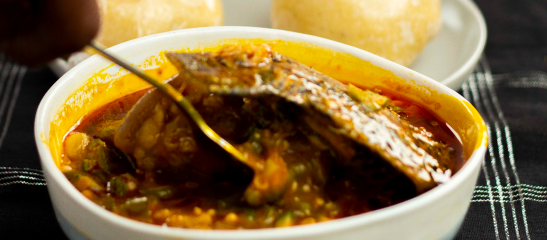

Sanitation
A high environmental stratification follows roughly along social classes. While high-end residential areas may show resemblance of averagely managed sanitation conditions, other urban areas are suffering from littering of mainly plastic waste.
Market
Ghana is generally not based on a supermarket culture. Most people buy household food stuff and other wares from open markets. You would find a buzzling atmosphere on these markets, with cars and human traffic crisscrossing a wide space of all sorts of food and household stuff.
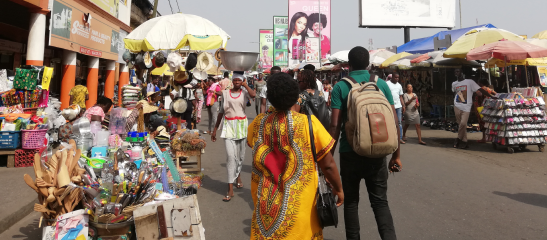

Transport
Though online booked taxi services such as bolt, uber, and yango are increasing their presence in the main urban centres, mini-buses are the common means of transport for most Ghanaians. They carry more than one person, often between 6 and 10 people. Fares are handed out in cash or mobile money on the bus, to the conductor, who Ghanaians call the ‘Mate’. For longer intercity distances, bigger busses that are more comfortable to travel even in the night are available.
Street hawking and begging
Closely associated with transport is a vibrant street hawking culture. One can buy almost anything on major roads, including fast foods, raw foods, dog chains, car tyres, pets, and wood products. Hawkers could easily pass for 100 meter runners, for their swift moves manoeuvring between vehicles to sell to passengers in moving cars.

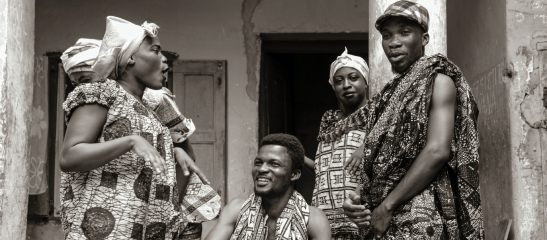
Funerals
Do not mistake funerals to be merry-making events. Mourning the departed is always a memorable event of all sorts of display. You will find mourners dressed in black or red in moving cars and walking singing and druming on the streets from the morgue to the funeral grounds (if distance is not more than a kilometer), amidst horning and cyclists. Children are not permitted at funeral grounds, unless accompanied by an adult.
Church and mosque services
Generally, it is a common saying that after every three blocks of houses is a church of a sort. Small, medium, and big churches and mosques are situated in high density residential areas. It is rather surprising to find a quiet church service. On all days of the week, especially on Sundays, loud noices from church premises are a normalised nuisance in Ghana that almost everyone has come to accept as part of social functioning. The haphazard location of churches and mosques is a consequence of poor enforcement of spatial plans. This in turn has been the outcome of the existence of parallel land governance authorities, held by chiefs as primary landowners on one hand, and by the state, which is the regulator of land use and spatial planning, on the other hand.
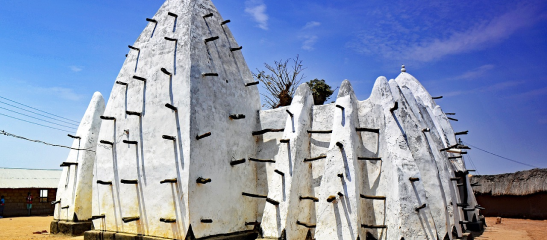
Meet the Guides
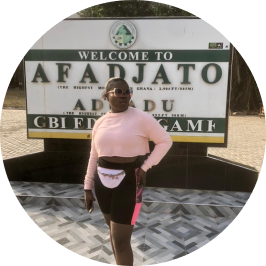
Lydia Adzaby
“Blessed are the curious, for they shall have an overflow of adventure.”
Lydia Adzaby is a travel enthusiast, and the leader of Lyns Travels in Ghana, who takes delight in exploring the beautiful scenery of Ghana as well as learning and teaching about the history and diverse cultures of Ghana. Lydia has toured in 11 out of the 16 regions in Ghana.
She is a paralegal by profession and has been working with Farafina Institute’s projects as an assistant for a number of years now.
Ivy Pearl
“Nothing gives me greater joy than showing off my beautiful country and its rich culture to the world.”
Ivy Pearl is a vibrant, fun and educative guide whose main interest is to make every tour memorable and fun as it should be. She’s travelled in about 10 regions in Ghana. She currently partners with a number of travel tour groups within Ghana. Ivy Pearls is a Medical assistant by profession.


Isabella Souzey
“It is such a pleasure for me to be of assistance in showing, enlightening and providing guidance to a group of tourists.
Isabella is a daring young travel enthusiast who has been on a number of tours both in Ghana and Togo. She leads both, solo and group tours for fun and educative purposes.
Emily Antor
“Being it uncovering hidden gems or highlighting well known landmarks, my exceptional skills as a tour guide make her the ideal choice for those seeking an unforgettable journey through the captivating landscapes and culture of Ghana.”
Emily’s warm and friendly demeanor creates an inviting and encouraging atmosphere for visitors. She is a an environmentalist by profession working with the Environmenetal Protection Agency in Ghana.


